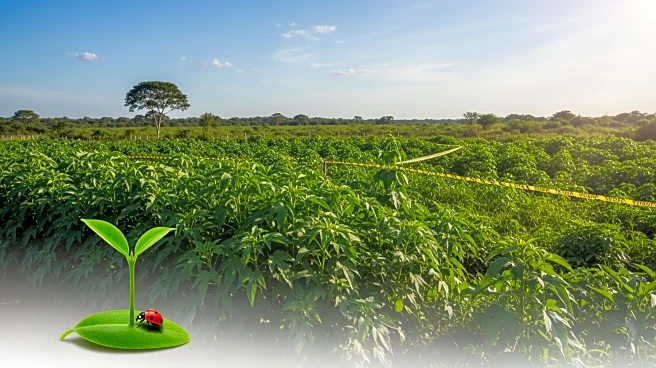What's Happening?
PepsiCo, in collaboration with Griffith Foods and Milhão, has initiated a direct farmer incentive pilot program in Brazil's Cerrado region to promote regenerative agriculture. This initiative introduces a hybrid 'Payment for Practice and Payment for Outcomes'
model, which compensates farmers for adopting sustainable agricultural practices. The program aims to cover 7,000 acres initially, with plans to expand to 30,000 acres, aligning with PepsiCo's full corn sourcing volume in the region. The Cerrado, a vital agricultural area producing significant volumes of corn and soybeans, faces challenges such as deforestation and soil degradation. The pilot program seeks to address these issues by providing financial incentives to farmers, encouraging practices like composting and reducing chemical fertilizer use. The initiative is part of PepsiCo's broader goal to implement regenerative agriculture across 10 million acres by 2030.
Why It's Important?
This pilot program is significant as it addresses the financial risks farmers face when transitioning to regenerative agriculture, a key barrier to widespread adoption. By offering direct economic incentives, the initiative aims to improve soil health, reduce greenhouse gas emissions, and enhance climate resilience. The Cerrado region is crucial for global food security, and this program could serve as a model for similar efforts worldwide. The collaboration between PepsiCo, Griffith Foods, and Milhão demonstrates how industry competitors can work together to drive systemic change in agriculture, potentially transforming food systems and contributing to environmental sustainability.
What's Next?
The pilot program is set to expand from 7,000 to 30,000 acres over three years, with a total investment of $1 million. As the initiative progresses, it may attract additional stakeholders interested in adopting similar regenerative practices. The success of this program could influence policy decisions and encourage other companies to implement similar models, potentially leading to widespread adoption of regenerative agriculture practices. The initiative's outcomes will be closely monitored to assess its impact on soil health, emissions reduction, and overall agricultural sustainability.
Beyond the Headlines
This initiative highlights the potential for regenerative agriculture to address environmental challenges while supporting economic viability for farmers. It underscores the importance of collaborative efforts in tackling climate change and promoting sustainable food systems. The program also reflects a shift towards a regenerative mindset in business, emphasizing restoration and community strengthening as key components of corporate responsibility.
















